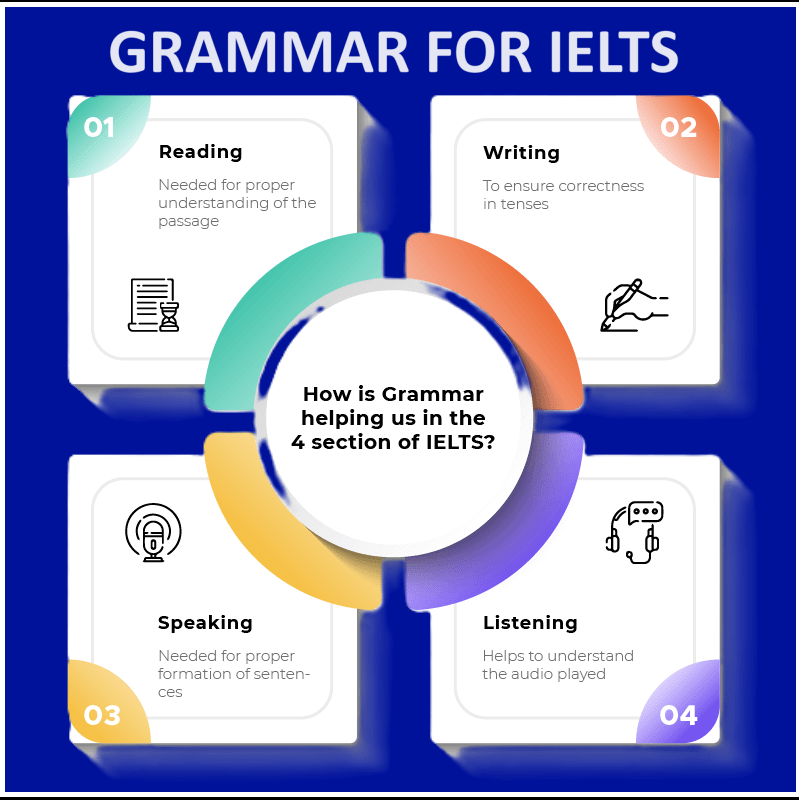Grammar For Ielts
On this page, we will learn about grammar for IELTS. Why is grammar so important in ielts? What is the process for marking IELTS writing grammar exactly? , Writing Band Descriptors for Grammar, Recognize the descriptors and IELTS grammar lesson links.
Why grammar is so important in ielts?
Although the IELTS test does not include a grammar section, the examiner will assess you on it during the speaking and writing tests.
These are the criteria on which you will be graded in each test:
Writing:
- Task Achievement / Response
- Coherence and Cohesion
- Lexical Resource
- Grammatical Range and Accuracy
Speaking:
- Fluency and coherence
- Lexical Resource
- Grammatical Range and Accuracy
- Pronunciation
As you can see, grammar accounts for 25% of each test.
You will be penalized if you make mistakes with word forms (for example, using a noun form instead of a verb form), therefore this is also a grammatical issue.
This is not to say that you should simply concentrate on grammar; other factors such as speaking fluency and your ability to answer the question and organize your response in writing are also important.
However, it is evident that you should work on improving your IELTS grammar, as this is often the area where candidates struggle the most and where their score suffers the most.
These will be highlighted in the explanations and exercises so you can see how they are significant.

What is the process for marking IELTS writing grammar exactly?
It is helpful to understand how IELTS grammar is graded in order to concentrate on improving it.
Each of the above-mentioned portions of the exam is assigned a band score (for a total of four), which is then averaged to determine your overall writing score.
For instance:
Writing:
- Task Achievement / Response - band 6
- Coherence and Cohesion - band 6
- Lexical Resource - band 6
- Grammatical Range and Accuracy - band 5
Overall score = 5.5
The two parts on lexis and grammar are shown in the table below. These have been derived from public band descriptions and demonstrate what the examiner is searching for.
The 'grammatical range and accuracy' column is identical to the public band descriptions, but the 'lexical resource' column only selects the grammar-related bits.
Writing Band Descriptors for Grammar:
If you look at the table closely, you'll see phrases like 'rare,' 'occasional,' and 'few' towards the top that allude to word form and grammatical problems.
As you get lower in the band 6 range, terms like 'some' appear, followed by 'noticeable' and 'creating difficulties.'
You may also see how crucial it is to be:
- Making sure your word forms are correct.
- Knowing how to construct complex statements.
- Increasing your vocabulary of grammatical structures.
- Correct grammatical usage (i.e.- minimizing your error density).
As a result, the pages you'll find here link to IELTS grammar explanations and exercises to help you improve your score and grammar.
| Band | Lexical Resource | Grammatical Range & Accuracy |
|---|---|---|
| 9 | Controlled lexical features; minor'slips' occur infrequently. |
|
| 8 | Produces a small number of spelling and/or word formation errors. |
|
| 7 | Occasional grammatical, spelling, and/or word formation errors. |
|
| 6 | There are some spelling and/or word formation problems,but they do not obstruct communication. |
|
| 5 | Errors in spelling and / or word structure that may be difficult for the reader to understand |
|
| 4 | Limited control over word structure and/or spelling;errors may put the reader at a disadvantage. |
|
| 3 | Errors have the potential to dramatically distort the message. |
|
| 2 | Word structure and/or spelling are essentially uncontrollable. |
|
| 1 | Only a few solitary words are allowed |
|
Recognize the descriptors:
If you look at the table closely, you'll see phrases like 'rare,' 'occasional,' and 'few' towards the top that allude to word form and grammatical problems.
As you get lower in the band 6 range, terms like 'some' appear, followed by 'noticeable' and 'creating difficulties.'
You may also see how crucial it is to be:
- Making sure your word forms are correct
- Knowing how to construct complex sentence
- Increasing your range of grammatical structures
- Correct grammatical usage (i.e.- minimizing your error density).
These pages are intended to assist you in improving your IELTS grammar, particularly in writing.
It can, however, clearly assist you in both speaking and reading, as it is simple to mistake what you have read if you are perplexed by varied sentence forms.
While all grammar is necessary for IELTS, there are a few things that are specifically linked to the exam.